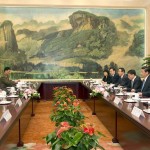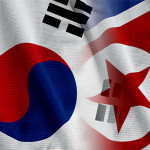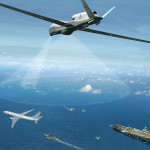- DETERRENCE: Pilotless planes, Pacific tensions
- DPRK: President Xi reaffirms denuclearization on Korean Peninsula
- ENERGY SECURITY: Overheated rhetoric on climate change doesn’t make for good policies
- GOVERNANCE AND CIVIL SOCIETY: North ice-breaker proposed in June
- CLIMATE CHANGE ADAPTATION: Climate change and older Americans: state of the science (review)
- AUSTRAL PEACE AND SECURITY: Hacked!
 DETERRENCE: Pilotless planes, Pacific tensions, Richard Parker, New York Times (13 May 2013)
DETERRENCE: Pilotless planes, Pacific tensions, Richard Parker, New York Times (13 May 2013)
To offset China’s anti-access, area-denial, the US Navy is betting on X-47, anti-submarine reconnaissance, long-range communication, and underwater drones. A Triton recon drone paired with a piloted P-8A anti-sub plane can sweep 3.4 million km2 of ocean in one flight. Cheap and unpiloted, drones lower the bar for aggressive behavior by US and Chinese leaders.
- Photos of the week: China’s got a stealth drone, John Reed, Foreign Policy (14 May 2013)
- Unmanned Aerial Vehicles – A challenge to a WMD/DVs Free Zone in the Middle East, Christian Weidlich, Jürgen Altmann et al, Academic Peace Orchestra, Policy Brief 8 (August 2012) [PDF, 1.4MB]
 DPRK: President Xi reaffirms denuclearization on Korean Peninsula, Xinhua News Agency (24 May 2013)
DPRK: President Xi reaffirms denuclearization on Korean Peninsula, Xinhua News Agency (24 May 2013)
North Korea sent Kim Jong-un’s personal emissary to China. It is unclear exactly what they discussed. However, no version of the “truth” includes a strategic framework. At best, articles refer to a return to the Six Party Talks which were important, but have been on hiatus for several years. China’s Communist Party echoed the theme of “rivers and mountains” while other parts of China’s government delivered stronger messages.
- Xi Jinping meets Choe Ryong Hae, Rodong Sinmun (25 May 2013)
- Choe Ryong Hae meets Liu Yunshan, Rodong Sinmun (25 May 2013)
 ENERGY SECURITY: Overheated rhetoric on climate change doesn’t make for good policies, Rep. Lamar Smith (R-Tex), Washington Post (19 May 2013)
ENERGY SECURITY: Overheated rhetoric on climate change doesn’t make for good policies, Rep. Lamar Smith (R-Tex), Washington Post (19 May 2013)
Congress man Lamar Smith is guilty of overheated rhetoric himself. The US reality is, new coal capacity cannot compete with gas option, and existing power plants will have a more assured coal market if regulatory reforms are pursued. George Will, in the meanwhile, fears that Obama’s executive orders affecting CO2 emissions “will vastly expand government’s regulatory powers”. The Republicans won’t have the luxury of fighting any climate change legislation and paint Obama un-American; hence all the huffing, puffing and panting.
- Obama’s tapped-out trust, George Will, Washington Post (16 May 2013)
- Josh Barro didn’t leave conservatism. Conservatism left Josh Barro, Ezra Klein, Washington Post (24 May 2013)
 GOVERNANCE AND CIVIL SOCIETY: North ice-breaker proposed in June, Kim Hee-jin, Joongang Ilbo (24 May 2013)
GOVERNANCE AND CIVIL SOCIETY: North ice-breaker proposed in June, Kim Hee-jin, Joongang Ilbo (24 May 2013)
The DPRK has proposed talks at various levels with ROK partners as tensions have eased on the Peninsula, inviting civilians back to the Kaesong Industrial Complex and proposing a joint commemoration of the anniversary of the June 15 Joint Declaration. Despite recent tensions, traditional political divides in the ROK regarding the DPRK have subsided and an increasing number of ROK conservatives support continued aid to the DPRK.
- Old political fault lines on N. Korea, U.S. disappearing, Chosun Ilbo (28 May 2013)
- North Korea ‘to allow Kaesong managers back’, BBC (28 May 2013)
- Bowing for normalization at Kaesong, Kim Jeong-hyo, Hankyoreh (28 May 2013)
 CLIMATE CHANGE ADAPTATION: Climate change and older Americans: state of the science (review), Janet L. Gamble et al., Environmental Health Perspectives, vol. 121, No. 1 (2013) [243 KB, PDF]
CLIMATE CHANGE ADAPTATION: Climate change and older Americans: state of the science (review), Janet L. Gamble et al., Environmental Health Perspectives, vol. 121, No. 1 (2013) [243 KB, PDF]
Climate change increases the exposure of a growing population of older Americans to a range of climate-related hazards. Although a growing body of evidence reports the adverse effects of heat on the health of older adults, research gaps remain for other climate-related risks. We need additional study of the vulnerability of older adults and the interplay of vulnerability, resilience, and adaptive responses to projected climate stressors.
- Heat-related illness in the elderly, Andrew Allen and Freddi Segal-Gidan, Clinical Geriatrics, vol. 15, no. 7 (2007)
- SWiFT: A rapid triage tool for vulnerable older adults in disaster situations, Carmel B. Dyer, et al., Disaster Medicine and Public Health Preparedness, vol. 2 (2008) [530 KB, PDF]
 AUSTRAL PEACE AND SECURITY: Hacked! Four Corners, Andrew Fowler and Peter Cronau, ABC Television (28 May 2013)
AUSTRAL PEACE AND SECURITY: Hacked! Four Corners, Andrew Fowler and Peter Cronau, ABC Television (28 May 2013)
One possible reason China is so committed to cyber warfare is it has little alternative.
Ball: It’s the only way that those relative primitive Chinese capabilities would have any hope against American carrier battle groups. If you’re a country like China and you don’t go first, then you end second. There is no way that the Chinese can win that unless they ensure that all the information and communication flows to the American Defence Force are so thoroughly degraded that the US cannot use its preponderance in those areas.
- Chinese hackers steal ASIO building plans: report, John Kerin and Christopher Joye, Australian Financial Review (updated 28 March 2013)
- US surveillance drones for Andamans? James Brown, The Interpreter (27 May 2013)
- Defence weighs suitability of Triton US drone program for maritime surveillance, AAP, The Australian (16 May 2013)
The Nautilus Peace and Security Weekly Report presents articles and full length reports each week in six categories: Austral security, nuclear deterrence, energy security, climate change and security, the DPRK, climate change adaptation and governance and civil society. Our team of contributors carefully select items that highlight the links between these themes and the three regions in which our offices are found—North America, Northeast Asia, and the Austral-Asia region.
Subscribe to NAPSNet to receive free weekly email reports
Editor
Contributors
- Deterrence: Peter Hayes
- Governance and Civil Society: Dyana Mardon, Yi Kiho
- Climate Change Adaptation: Saleem Janjua
- DPRK: Roger Cavazos
- Energy Security: Nikhil Desai
- Austral Peace and Security: Richard Tanter

